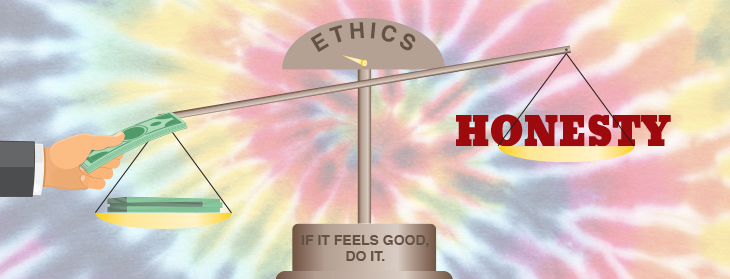
Are Changing Ethics a Reflection of Life Stages? Let’s hope…
Posted On May 17, 2017
Has relativism taken over in the digital age? Are millennials more likely to believe the ends justify the means? Does the largest generation in today’s workplace believe that ethics are negotiable in business?
The Wall Street Journal recently cited an EY survey that would seem to say so – or at least that it’s more prevalent than in previous generations.
In interviewing more than 4,000 people in 41 countries in Europe, the Mideast, Africa and India, the study found that one in four of the millennials surveyed could justify paying bribes in order to support their business (compared to 14 percent of all other employees). Seventy-three percent of the millennials said unethical behavior, in general, can be justified to help a business survive, and one in five said they’d act unethically to further their own careers.
Author Jean Twenge (Generation Me) chalks it up to the “if it feels good, do it” mantra of the modern age. But that mantra, if we’re honest, isn’t all that modern. It harkens back to the free love and pharmaceutical experimentation of the 1960s.
Perhaps it’s that the ambition of millennials is more representative of their youth than their generation. Young people are more willing to take risks and are often hungrier for rapid success than their older, more experienced counterparts. This can lead them to cut corners.
Twenge acknowledges this to the Journal, noting that it’s possible that the same millennials who would have no problem with unethical behavior now may mature into a more legalistic viewpoint as they climb the company ladder.
Or maybe not. One-third of the board directors and senior managers interviewed in EY’s survey said they could justify a little green under the table to win a contract or keep a client. Twelve percent of those board directors and senior managers said they’d be OK with giving false information to management to help their own careers.
In all, 77 percent of those execs said they’d justify unethical behavior to help their business survive. While it’s possible that some of them are millennials, it’s likely that most aren’t. And millennials who are just starting out may be more inclined to follow the lead of a corner-cutting boss in order to establish a foothold in their careers.
Don’t blame participation trophies for this one. If the ethics of millennials in the workplace are fluid, it appears that it’s learned behavior.